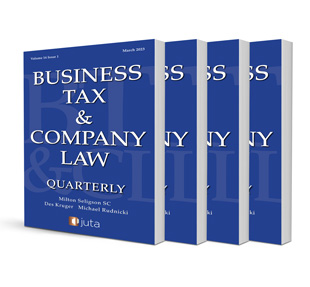
Navigating the VAT Maze: Input Tax Deductibility for Holding Companies and Private Equity Structures in the Post-Woolworths Era
Authors: Joon Chong and Des Kruger
ISSN: 2219-1585
Affiliations: Partner, Webber Wentzel; Consultant, Webber Wentzel
Source: Business Tax & Company Law Quarterly, Volume 16 Issue 3, 2025, p. 1 – 14
Abstract
This article provides a comprehensive analysis of the evolving legal landscape governing value-added tax (VAT) input tax deductibility for holding companies in South Africa, as well as for private equity structures. It examines the seminal judgments in Commissioner for the South African Revenue Service (CSARS) v De Beers Consolidated Mines Ltd, the recent landmark case of CSARS v Woolworths Holdings Limited, and the corroborating Tax Court decision in IT 76795. The analysis reveals a fundamental jurisprudential shift away from the restrictive, transaction-focused approach established in De Beers towards the holistic, purpose-driven framework solidified in Woolworths. This evolution presents both significant opportunities and new compliance imperatives for corporate structures, particularly within the private equity (PE) sector.
The central principle emerging from this body of case law is the critical importance for a holding company to defi ne, structure, and evidence its status as an ‘active investment holding company’. To successfully claim input VAT on acquisition, capital-raising, and other strategic expenses, a holding company must demonstrate that its core enterprise involves the continuous and regular provision of taxable supplies – such as management, financial, or administrative services – to its underlying portfolio companies for a fee. The mere passive holding of shares and receipt of dividends or interest is insufficient to constitute a VAT enterprise for the purposes of deducting input tax on associated costs.
The core thesis of this article is that the test for deductibility has evolved. The question is no longer whether an expense has a ‘direct and immediate link’ to a specific operational transaction, but rather whether it has a clear ‘functional link’ to the company’s overall, continuous enterprise. The Woolworths judgment has affirmed that costs incurred in furtherance of strategic expansion, such as capital-raising fees, are deductible if they serve to enhance and grow an active investment management enterprise.
For the PE industry specifically, this represents a pivotal moment. The strategic imperative is clear: PE holding companies must proactively structure their operations to align with the principles of the Woolworths judgment. This involves establishing formal management service agreements, charging market-related fees, and maintaining meticulous records that evidence active strategic involvement in portfolio companies. By doing so, they can create a defensible basis for claiming input VAT on a wide range of transaction costs, thereby mitigating tax leakage and enhancing overall fund returns.